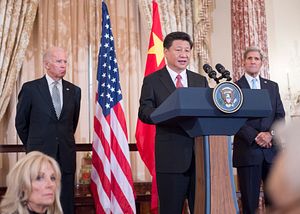By now it has become a fairly predictable pattern.
A week or so before a state visit to the United States by the Chinese top leader, an intense media campaign will be launched to portray U.S.-China relations in the most positive light. This media blitz is called zao shi in Chinese, which can be roughly translated into English as “creating a favorable atmosphere.” Many Chinese officials (especially from the Ministry of Foreign Affairs), scholars, and pundits are enlisted in the campaign. Some U.S. scholars and pundits, as well as a handful of former officials, also come out and speak in glowing terms about the bilateral relationship.
Meanwhile, as a critical component of creating a favorable atmosphere, Beijing will place a massive order of American products — usually Boeing aircrafts worth dozens of billions of dollars — before or during such a visit. Such a shopping spree is intended as a gesture of good will. For in the Confucian tradition, a guest is supposed to bring a gift to the host to show his or her appreciation of the host’s hospitality.
As a result of the media bombardment, the bilateral relationship suddenly enters into a honeymoon, albeit an artificial and short one. Disputes or tensions over Taiwan, Tibet, human rights, trade, cyber security, and the South China Sea are temporarily put aside, as if they were unpleasant memories of the past. The chorus by these officials, scholars, and pundits is a rather reassuring one: that Beijing and Washington are jointly working toward a stable and cooperative partnership, that the coming visit will set the tone for bilateral relations for the next decade, and that Beijing and Washington have never had better times.
One can certainly make a strong case for such a media promotion. A state visit — with all the pomp that accompanies it — should take place in a cordial setting, not against the backdrop of rising tensions or imminent conflicts. A media campaign that highlights the positive aspects of the U.S.-China relationship will probably contribute to that cordial setting. Besides, such a promo sends a strong signal to Washington that Beijing deeply cares about this relationship, and the U.S. president may reciprocate by sending similar signals to his Chinese counterpart. Such reciprocal signaling, one can contend, may well lead to major accomplishments or even breakthroughs in bilateral relations.
But the negative consequences of such a media campaign far outweigh its potential benefits. First and foremost, an artificial honeymoon terribly misleads the Chinese public. For a few days they are incessantly bombarded with positive statements about the United States and U.S.-China relations, and it is only natural for many of them to believe that there will be only smooth sailing ahead.
The end of the state visit means the end of the honeymoon; there is no such thing as a lifelong honeymoon. When things are back to normal, disputes or tensions will resume, with many of the same Chinese officials, scholars, and pundits now blaming the United States for these disputes or tensions. Faced with such a quick turn of events, many ordinary Chinese may well believe that Washington alone is responsible for the sudden downturn in the relationship.
Moreover, to create a favorable atmosphere for a state visit, Beijing should enlist the U.S media to disseminate positive messages among the American elites and ordinary people. But under the American political system, no president has the authority to tell a media outlet what or how to report about a state visit. Nor, given the prevailing journalistic norms in that country, does a media outlet feel obliged to hush up for the sake of a visiting foreign leader. In the end, zao shi boils down to a Chinese media campaign targeting almost exclusively the domestic audience.
Finally, the commercial aspect of zao shi highlights Beijing’s problematic assumption about the relationship between economics and politics. Purchasing billions of dollars’ worth of American products surely adds to economic interdependence, but economic interdependence does not necessarily translate into political interdependence. Today bilateral trade has surpassed $500 billion, with each country being the other’s second largest trade partner. Ongoing tensions over the South China Sea, however, clearly show that the political and economic aspects of the bilateral relationship are largely separated from each other. An expensive gift from the guest may not win the heart of the host.
So it is time for Beijing to rethink how to plan the next state visit to Washington. A state visit is the rare occasion where the top leaders of two countries have candid discussions about agreement and disagreements, potential for cooperation and conflicts, and how to expand cooperation while managing conflicts. It is not about creating the illusion of a honeymoon.

































